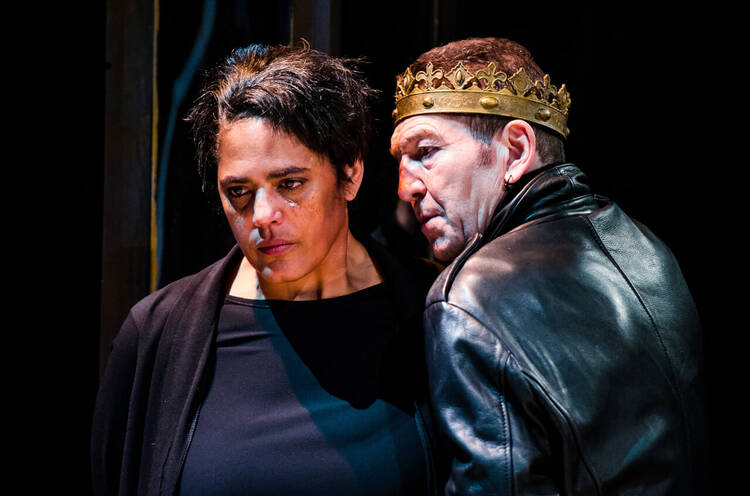This outstanding production of “Richard III” is timely at this moment for democracy, when unsubtle, naked power is such a menace in so many countries. As questions arise about leadership and power, or their proper use, this staging of Shakespeare’s dark political play does not need to labor the point. Greg Hicks, an insecure and malevolent Richard, lets the words, spat from his bitterly twisted face and body, do their job. Performed in the small off-West End Arcola Theatre, in the fashionably unfashionable borough of Hackney, this is a production that never asks us for sympathy for Richard but lets his total lack of empathy, his misanthropy and his misogyny speak for itself. It would be fascinating were the producers able to arrange a quick transfer to a venue somewhere near Washington’s White House.
Richard Gloucester is splendidly acted by Hicks, costumed all in black, a shiny chain clutched in his leather-gloved hand. He is a thug, a gangster. Hicks has been blessed with a tough-guy face that he can appositely contort as he scowls and glares at the other characters and, uncomfortably, the audience. This Richard looks for no pity from us but provokes us to resist his crooked self-advancement. His is a permanent rhetoric, justifying his corrupt aims and means, and is not beyond harnessing religious citations to his cause.
The spare set, industrial and grimy in this converted former paint factory, matches the mood. As the audience is called infrom the cheerful café-bar, Richard is found already on stage, hunched at a table, playing with a child’s spinning top. John Coltrane is piped through the speaker system. If your seat is on the far side of the auditorium, you cannot avoid brushing close to him, and you feel the fear. Full of menace, he channels something of Harold Pinter right here in the grimy East London streets where Pinter grew up. Only once he has begun his opening “winter of discontent” soliloquy and stands do we realize that his chain holds together his deformed body, linking his twisted leg to his arm, the “blasted sapling, withered up.” We begin to suspect that his malevolence is chained to self-hatred.
Richard needs no Lady Macbeth to urge him on; his demons and bad spirits are entirely within him.
Everyone else, as far as Richard is concerned, has worth only insofar as they can advance his own vaulting ambition. He needs no Lady Macbeth to urge him on; his demons and bad spirits are entirely within him. Mehmet Ergen, the show’s director, has given us no warrant to empathize with Richard’s painful deformities, as his inner torment and warped reasoning are gradually laid bare. This interpretation emphasizes Richard’s cynicism; he will turn on his closest henchmen without remorse the moment they hint at apostasy from his cause. He is comfortable distorting Christian piety to “seem a saint, when most I play the devil.” Unrepentant misogyny marks the horrifying move he makes on the mourning Anne, widowed by Richard’s own amoral action. The audience gasps audibly at his grinning aside, “I’ll have her, but I will not keep her long.”
This is a fine ensemble production. The dramatis personae can be divided into two parts—his collaborators and his victims. Most of the former become the latter. Matthew Sim’s Catesby is outstanding; a long-coated, bespectacled, Himmler-like character with a coke habit who, if he has any doubts about what he is seeing, keeps them to himself for as long as he can. Sim delivers Catesby’s assurance to Richard that “It is a reeling world, indeed, my lord/ And I believe ‘twill never stand upright” with just the right touch of deviousness; even the tyrant is taken in. The four female parts are wonderfully played, too. Margaret (Jane Bertist), the Duchess of York (Annie Firbank), Queen Elizabeth (Sara Powell) and Lady Anne (Georgina Rich) all avoid plaintive sentimentality, making their grief and horror plain.
The production loses its direction slightly at the point when the citizens of London and their mayor are supposed to be seduced by Richard’s false modesty. Buckingham (an excellent Peter Guinness) and Catesby are the spin doctors and event managers, manipulating the populace and the hapless mayor—a splendidly bumbling performance by Jim Bywater, who doubles as King Edward. But we don’t quite sense how the crowd, like their mayor, gets taken in.
Richard is the outsider who craves to be an insider despite appearing to deplore the established order. He is devoid of emotional intelligence; his moral growth stunted, the nearest he comes to joy comes when he plays with a toy airplane that belonged to one of the young princes he’d had murdered.
We need, right now, every opportunity to remind our leaders in public life about leadership as service, watchful for when contemporary Richards are tempted by his view that “conscience is but a word that cowards use.” Fake news and alternative facts are stock in trade for Richard and his allies, but we can readily think of an answer in our time to the Scrivener’s question in the play, "Yet who so bold but says he sees it not?"
It is a timely query in our allegedly post-truth era. America readers anywhere near London should go “with some little train” not to Ludlow but to Hackney. This fine production is not to be missed; it runs only until June 10.











Shakespeare created his characters with an eye on PC. It was dangerous to offend the Tudors. Hence, Richard III who was nowhere the arch villain he was cast as, had to be sacrificed because of his dealing with Tudor successors (children) who were a threat to him.
PC distortions include King MacBeth, "Shylock", Julius Caesar, and others.
Do we have a PC distortion of Trump?